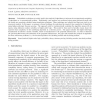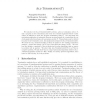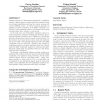148 search results - page 1 / 30 » Formally Analyzing Expected Time Complexity of Algorithms Us... |
JCST
2010
12 years 11 months ago
2010
Probabilistic techniques are widely used in the analysis of algorithms to estimate the computational complexity of algorithms or a computational problem. Traditionally, such analys...
TC
2010
13 years 3 months ago
2010
—Reliability analysis has become a tool of fundamental importance to virtually all electrical and computer engineers because of the extensive usage of hardware systems in safety ...
MEMOCODE
2006
IEEE
13 years 10 months ago
2006
IEEE
Timed I/O Automata (TIOA) is a mathematical framework for modeling and verification of distributed systems that involve discrete and continuous dynamics. TIOA can be used for exa...
TACAS
2009
Springer
13 years 11 months ago
2009
Springer
We introduce the All-Termination(T) problem: given a termination solver, T, and a program (a set of functions), find every set of formal arguments whose consideration is sufficie...
PODC
2010
ACM
13 years 8 months ago
2010
ACM
Mutual exclusion is a fundamental distributed coordination problem. Shared-memory mutual exclusion research focuses on local-spin algorithms and uses the remote memory references ...



